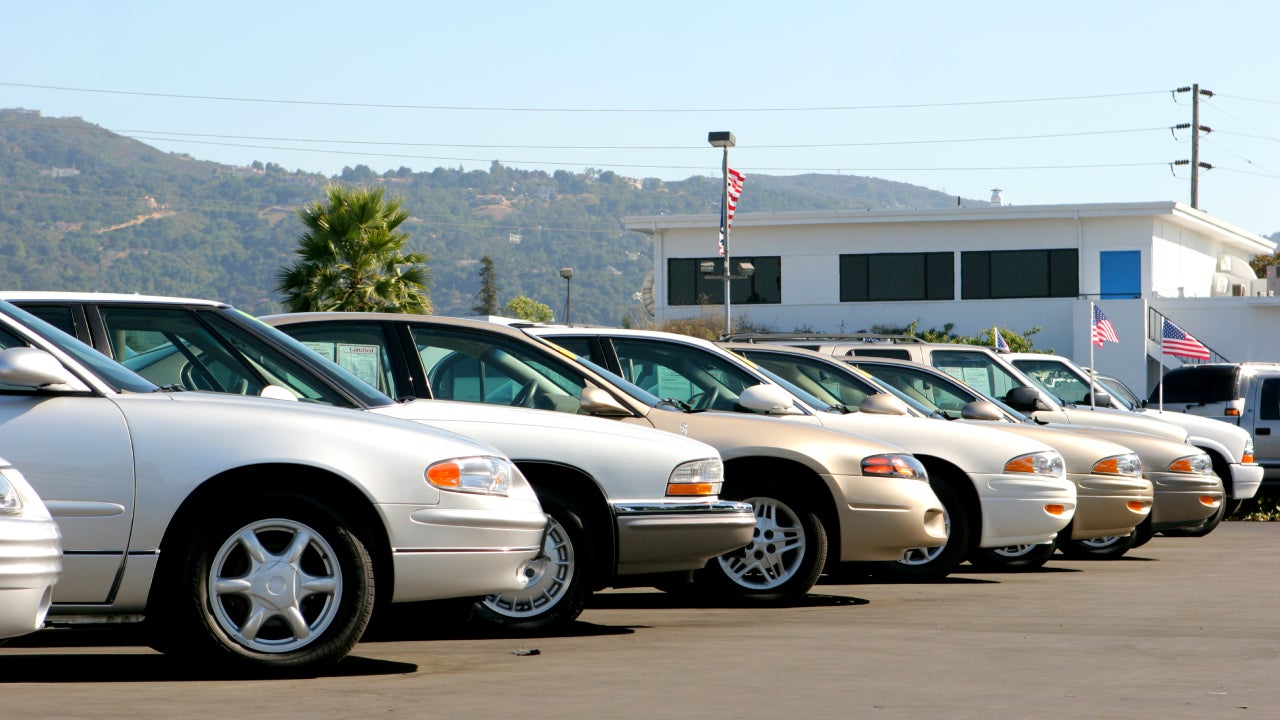3 Types of car insurance fraud

Key takeaways
- Car insurance fraud costs policyholders up to $700 each year — even if they’ve never been involved in an insurance scam.
- Policyholders should be aware of common insurance scams run by agents and repair shops, such as false policy sales and fraudulent windshield replacement.
- Keeping detailed records and researching any agent, insurer or repair shop can help you avoid becoming a victim of insurance fraud.
Car insurance fraud is a costly problem — even for drivers who’ve never been involved in a fraud scheme. Staged accidents, fraudulent applications, untrustworthy repair shops and fake agents cost insurers billions of dollars each year, and the cost is passed on to consumers in the form of rising premiums. According to FBI estimates, the annual cost of non-health insurance fraud totals over $40 billion, adding from $400 to $700 to every family’s premiums each year.
What is car insurance fraud?
Car insurance fraud refers to all types of fraudulent activity in the world of auto insurance — from shady individuals selling fake policies to policyholders bending the truth to get a lower premium or bigger claim payout. While all car insurance fraud is a problem, some forms of fraud are easier to spot than others.
Insurance fraud impacts millions of people across the U.S., including those who have never directly been involved in a scam. According to the Bankrate Financial Fraud Survey, about 1 in 3 U.S. adults (34 percent) have experienced financial fraud or a scam in the past 12 months (since January 2024). Of those who reported being scammed, 37 percent lost money as a result. But because auto insurance fraud also costs insurers money, it drives up the cost of coverage for others, including those who have never fallen victim to fraud.
According to Jim Quiggle, former communications director for the Coalition Against Insurance Fraud (CAIF), insurance fraud is a “major league crime involving a wide variety of schemes.” As an everyday driver, it helps to know what insurance fraud looks like.
3 common types of car insurance fraud
Insurance fraud can victimize unsuspecting drivers who don’t realize they are dealing with a dishonest agent or repair shop. However, sometimes drivers are the party at fault for committing fraud by lying to an insurer. Below are just three of the most common types of auto-related insurance fraud you should know about in 2025.
1. Agent fraud
Buying car insurance through a licensed agent may seem like a straightforward way to secure coverage, but beware: some scammers may pose as insurance agents in order to get your information and capture payments, leaving you uninsured.
This form of fraud can play out in a few ways:
- Someone who isn’t licensed poses as an agent for a legitimate company: You may receive communication from someone claiming to be an agent for a legitimate insurance company. However, that person is not actually an agent and is really pocketing your premium payments, while the insurance company has no record of you.
- A licensed agent pretends to sell you insurance but doesn’t inform their company: Maybe the agent is actually licensed, but decides to keep your premium for themselves without informing the insurer they work for of the sale.
- Someone tries to sell you insurance from a company that isn’t authorized to provide it: In this case, the insurance company itself is fraudulent and won’t pay claims if you’re in an accident. The documents you receive may look legitimate, but the company isn’t authorized to sell auto insurance.
Another common practice is known as “sliding,” in which an unethical agent slips extra coverage that you didn’t want into your policy. This particularly sneaky form of auto insurance fraud can add a few hundred dollars a year to your premiums while padding the agent’s commission. Vigilant drivers who investigate their agents ahead of time and keep a close eye on what they’re buying are less likely to fall victim to sliding scams.
To avoid premium theft, drivers should work with trusted agents and always verify their coverage independently with the insurer. Some ways you could go about finding a trusted agent include:
- Watch for red flags: Aggressive sales tactics and a delay in receiving key documents, like your insurance card, can be signs that you’re working with a fraudulent agent or company. Always follow up if you don’t receive your documents promptly.
- Beware of “too good to be true” rates: Everyone wants cheap insurance, but the National Association of Insurance Commissioners (NAIC) warns that quotes significantly lower than competitors’ can be a sign of possible fraudulent behavior.
- Research complaints: An insurance agent with good standing will typically have accessible information about their professional background. While conducting your research, also explore whether any complaints have been lodged against them and how serious those allegations are.
- Confirm the agent’s license: You can validate an insurance agent’s license by checking your state’s license database.
- Compare advice: Similar to comparing car insurance quotes, it may be beneficial to seek advice from multiple agents to assess their recommendations. If an agent’s guidance differs significantly from that of others, it’s worth questioning the reliability of the information provided.
- Research carriers: If you’re offered a quote from an insurance company whose name you don’t recognize, take a minute to research the company before signing up by exploring the NAIC’s company search tool or reviews of top-rated carriers. If you’re struggling to find information about an insurer online, it could be a sign that they’re not a legitimate business.
Agent fraud isn’t always easy to spot. In March, a Reddit user posted on r/Scams about their experience with a fraudulent actor posing as an insurance agent:
Reddit user review
2. Windshield replacement rip-offs
Windshield replacement deductibles vary by state, insurer and policy. However, three states — Florida, Kentucky and South Carolina — do not allow insurance companies to charge a deductible for windshield replacement. Unscrupulous glass replacement contractors in these states have used this as an opportunity to trick customers into having their windshields replaced even if minimal damage is present.
This scam is especially prevalent in Florida. Here’s how it works:
- Someone approaches you offering a free windshield repair or replacement: This could be a freebie offered by your local repair shop while you’re getting an oil change, a promotion touted by a door-to-door salesperson or even a pitch from someone who approaches you randomly in a parking lot. The scammer may point out minor or nonexistent damage to your windshield, or they may simply frame this as a free benefit to you.
- You may be asked to sign a piece of paper: This form is called an assignment of benefits (AOB), which gives the repair company the right to file an insurance claim in your name and pocket the cash for themselves.
- The shop files an insurance claim for unnecessary repairs: While this claim may not cost you money directly, the flood of fraudulent windshield claims contributes to higher costs for insurers, driving rates up across the board in fraud-happy areas. Multiple fraudulent claims filed by the shop could also lead to cancelation or nonrenewal of your policy if your insurance company notices the fraud.
- Fraudulent repairs may not be reliable repairs: Companies that perpetrate this type of fraud may not have the correct equipment or training to complete high-quality windshield repairs, potentially leaving you with a vehicle that’s more vulnerable to damage than before.
Auto glass fraud has seen a downturn in Florida in recent years, thanks to the passage of Senate Bill 1002, which banned the use of AOB forms by repair shops for motor vehicle glass replacement or repairs. Since the bill was signed into law in 2023, the Florida Justice Reform Institute (FJRI) recorded an 83 percent drop in auto glass lawsuits.
Talking to neighbors and others in your community could help you spot the signs of a common local auto glass fraud. In a local Florida Reddit forum in 2024, users shared their experiences of windshield fraud:
Reddit user review
3. Car insurance premium evasion
While it’s important to be on guard for attempted fraud by agents or repair shops, you should also be aware of the most common type of fraud committed by insurance policyholders — premium evasion. While you might not set out to commit fraud when signing up for insurance, it may be easier than you imagine to inadvertently fall into this category.
Premium evasion involves giving incorrect or incomplete information to your insurance company in order to qualify for a lower rate. Some of the most common tactics for premium evasion include omitting a driver, such as a spouse with a bad driving record or a teenager with high premiums, from your policy or giving another person’s address in order to earn a lower rate. You could also be guilty of insurance fraud if you fail to report an accident or violation when asked.
Any dishonesty or attempted premium evasion could result in your policy being canceled or nonrenewed as well as claims being denied. If your actions are found to constitute fraud, you could even be charged with a crime in most states. Take steps to avoid these consequences:
- Always be honest with your insurer: When purchasing a policy or filing a claim, make every effort to provide accurate and complete information. Don’t hold information back because you’re afraid it will cause your rate to go up; doing so could land you in even more trouble.
- Keep detailed records of accidents and tickets: If you’re not great at record-keeping, it can be easy to forget exactly when you received a ticket or what happened during an accident. But failure to report this information accurately could lead to dropped claims or canceled policies if your insurer finds information that conflicts with what you’ve told them.
- Work with an agent to find affordable rates: Many instances of rate evasion can come out of a combination of desperation and good intentions. If you’re trying to find affordable rates for yourself or a family member, try working with a local independent agent or broker who can help maximize your discounts rather than trying your own strategies to bring down the bottom line.
What are other types of car insurance fraud?
Auto insurance fraud can take many forms. At its heart, the goal of most types of car insurance fraud is to extract more money out of an insurance provider than would normally be issued. The following are examples of fraudulent behavior:
- Staged accidents: One of the most well-known types of insurance fraud, this type of scam involves intentionally causing a collision with another vehicle or a pedestrian in order to get a fraudulent payout.
- False claims: False claims often go hand-in-hand with staged accidents and involve individuals fabricating or exaggerating events to file insurance claims for incidents that did not occur or for damages that are unrelated to covered events.
- Filing retroactively: Attempting to file a claim for an incident that took place before your policy was in effect is a breach of your insurance policy contract.
- Faking a stolen car: Reporting a vehicle as stolen to an insurance company when it has not been stolen with the intent of receiving compensation for its purported loss is a form of fraud.
- Exaggerating or faking injuries: If you are involved in an accident and insurance will pay for some of the damages you experience, embellishing or fabricating the extent of your injuries following an accident to claim higher compensation is fraud.
It’s also worth knowing what is not a scam. In the era of online insurance shopping, you might encounter lead-generation websites that ask you to fill in your personal information in exchange for car insurance quotes. Some sites will return actual quotes, while others simply sell your information to insurance companies in order to turn a profit. While this isn’t a form of fraud, you may prefer to do business directly with an insurance agent or a trusted comparison site in order to avoid unsolicited calls from multiple insurers.
Tips for avoiding car insurance fraud
Knowing that auto insurance fraud exists is the first step. To protect yourself, it is beneficial to know some additional ways to avoid these scams:
- Document all incidents: This includes accident damage, police reports and invoices. This could help in fighting future claim disputes.
- Look out for unusual behavior: If something seems suspicious, trust your instinct. For example, a fellow driver or a mechanic who does not provide much information about themselves but expects personal or payment information from you could be cause for concern.
- Keep your vehicle insurance information private: Outside of exchanging information after an accident, dealing directly with your insurer or handling official claims or reports, you might want to consider being wary of any other parties requesting information about your policy.
- Verify the legitimacy of your agent and insurance company: Scammers may pose as an insurance agent, agency or insurance company to sell fraudulent policies. You can use your state’s insurance database to verify if the agent and the insurance company are real and licensed before providing your personal information and payment details.
- Use defensive driving practices: When you drive defensively, you can reduce your risk of being involved in an accident and unintentionally falling victim to car insurance fraud. Keep distance between your car and the driver in front of you, drive the speed limit and scan your surroundings to limit potential accidents.
- Double-check prices: Be suspicious of insurance prices that seem too good to be true. If you receive a much lower quote for car insurance than the competition, it could be a potential scam or coverage filled with exclusions you will not discover until after you accept coverage.
- Report suspected scams: You can report insurance fraud in a number of places — to your insurance company, to your state’s insurance fraud bureau (if applicable), to the FBI or to the National Insurance Crime Bureau (NICB).
Frequently asked questions
Why we ask for feedback Your feedback helps us improve our content and services. It takes less than a minute to complete.
Your responses are anonymous and will only be used for improving our website.
You may also like

What are the three types of pet insurance?


What are the different types of car insurance coverage?





